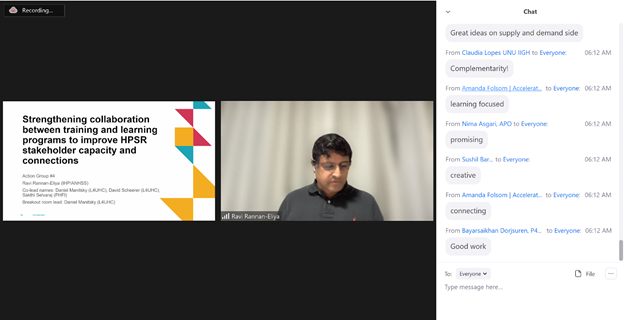Author: Christina Shaw, Knowledge Management & Communications Officer, Results for Development
To ensure that health policy and systems research institutions (HPSRIs) can more effectively generate evidence and support the translation and use of that evidence locally, it is important to foster collaboration and learning among HPSRIs, policymakers, and training and capacity development initiatives throughout the region. To accomplish this feat, the Accelerator and the WHO Alliance for Health Policy and Systems Research (Alliance) organized a six-part co-creation workshop series focused on strengthening the ecosystem for health policy and systems research in Asia. Through this series, various actors co-developed a shared vision of a stronger and enabling HPSR ecosystem characterized by strong demand and use of evidence by policymakers and implementers, greater local investment in HPSR, and anchored by well-capacitated HPSRIs involved in all functions of the evidence to action cycle.
Action groups co-led by HPSRIs and platforms were established to iterate on and refine ideas to enhance partnerships and programming, foster dialogue, and create supporting tools and products to realize the shared vision and enhance the role HPSRIs play in the evidence to action cycle.
In March, participants from the co-creation series came together for an Ideas Marketplace to provide feedback, collaboratively build upon ideas generated by the action groups, and identify cross-group linkages to strengthen the HPSR ecosystem. During the Ideas Marketplace, four action groups pitched five innovative ideas to realize the shared vision, ranging from generating demand for implementation research to mapping and networking of HPSRIs to identifying sources of domestic financing. Here are some of the key highlights.
This blog highlights co-created ideas that were pitched at the March Ideas Marketplace.

Emerging Ideas from the Marketplace
From the action group focused on advancing implementation research partnerships, two promising ideas emerged – one focused on a regional landscape analysis of effective marketing strategies for implementation research and a second on generating demand for implementation research.
Landscaping of Institutions Leveraging Implementation Research
The landscape analysis aims to identify countries and HPSRIs that have engaged in implementation research (IR) and used IR evidence to inform policymaking. Following the analysis, a catalog and workshop would be developed to identify strategies for effective marketing of IR to policymakers. Participants believe this activity to be an essential step towards realizing a stronger HPSR ecosystem but would like to see the landscape paired with an activity to ensure testing and take-up of the strategies identified.
Generating Demand for Implementation Research
The second idea centered on generating demand for IR through the co-development of a policymaker engagement strategy. Resource HPSRIs, which are more mature and established institutions with significant experience would pair with emerging HPSRIs to co-develop this strategy, alongside a learning partner to document and feedback learnings to the broader community. This approach would strengthen partnerships and promote learning capacity, but it is important to identify the right partners – including policymakers – who could be the targets of the engagement, and mentorship pairs who are willing to take ownership.
Establishing Regional Network of Policymakers and HPSRIs
The action group working on establishing collaborative networks presented a vision for a supportive network of regional HPSRIs and policymakers, catalyzed through the development of a database featuring HPSRIs at national and sub-national levels. This database would serve as the foundation for collaborative learning and meaningful exchange among HPSRIs, promoting cross-learning and addressing challenges of fragmentation within the HPSR ecosystem. Participants noted that it will be key to explore how to address existing fragmentation and convert competition into collaboration.

Strengthening Training to Enhance Policy Impact
The action group centered around training opportunities for HPSRIs and policymakers proposed a way to strengthen collaboration and synergies between existing training and learning programs to enhance policy impact and strengthen regional knowledge translation capacity. Participants felt this approach could be embedded within existing programs, such as the World Bank’s Flagship Course for Universal Health Coverage (UHC) and Leadership for UHC (L4UHC), for long-term sustainability, which may address some of the questions around how learnings, materials, and resources could be used following the pilot phase. However, participants also suggested more attention may be needed at the national or sub-national level than at the regional.

Framework for Assessing Funding Opportunities
Lastly, the action group collaborating on domestic funding sources and opportunities presented a framework to assess HPSR funding sources and opportunities through (i) increasing and institutionalizing policymaker demand and (ii) strengthening HPSR capabilities to attract and solicit public and private financing resources. Participants responded positively to this idea and its ability to directly strengthen the HPSR ecosystem in Asia but described a need for additional details on funding management, distribution, and sustainability.

Next Steps for Catalytic Funding
Participants were inspired by the complementarities between the groups, leading to connections and excited declarations of collaboration. Moving forward, the action groups will iterate on the pitches, and interested HPSRIs, platforms, and co-creation partners are invited to submit a proposal for catalytic funding that will enable them to pilot these ideas in the region.
We are very grateful for the active engagement from all Marketplace participants and look forward to seeing these promising ideas implemented and strengthening the HPSR ecosystem in Asia. For those who were unable to attend the Marketplace, the presentations and session recordings can be found on the co-creation website.




